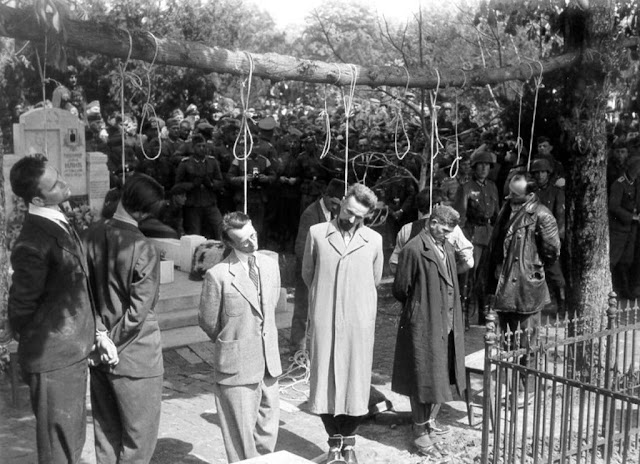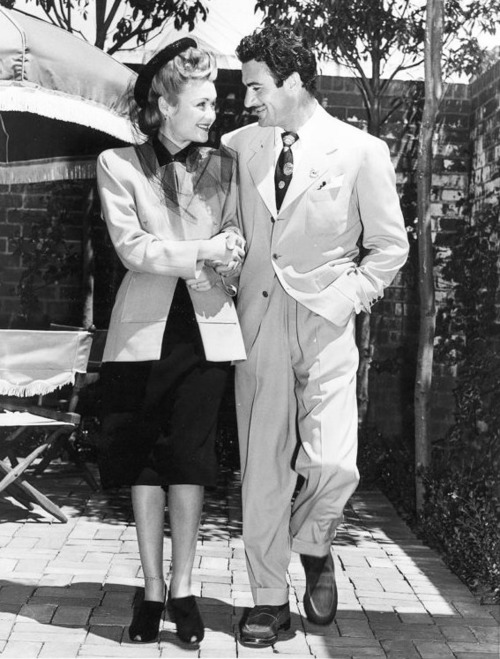Tuesday 22 April 1941
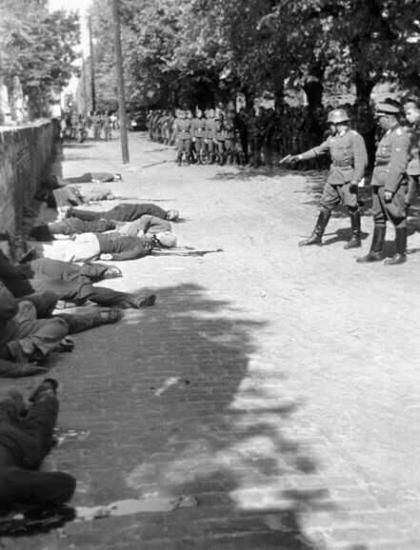 |
| German executions in Pancevo, Serbia. These are usually identified as killings of civilians. There also is an argument that these are partisans. 22 April 1941 (Photographer: Gerhard Gronefeld). |
The Italians remain violently upset that they have been excluded from the surrender of Greek forces in Albania. In fact, they open an offensive on the Epirus front, where the Greeks fight back and, following the established pattern, give little ground and inflict heavy casualties on the Italian attackers.
Hitler - conflicted between his roles of military warlord and statesman - tries to placate Mussolini. He has his military headquarters (OKW) rush a draft of the surrender terms to Rome to "keep Italy in the loop." Mussolini, however, loudly proclaims that Italy could have defeated Greece by itself and demands to be included in the setting of any surrender terms. After looking over the OKW agreement, he objects to provisions allowing Greek officers to keep their sidearms because they have humiliated the Italian troops. The Germans - meaning Hitler - reject Mussolini's quibbles on that one score, but basically give him everything else that he wants. This includes handing over the entire Yugoslav and Greek navies to Italy (which admittedly are not that large).
 |
| Victims of the Pancevo Massacre being marched to their executions. |
British Prime Minister Winston Churchill sends a message to Middle East Commander General Archibald Wavell telling him, regarding the evacuation from Greece:
In the execution of this policy you will no doubt not worry about vehicles or stores, but get the men away. We can re-arm them later.The main problem for the Allied troops in Greece is that their left flank was supposed to be defended by Greek troops, but the Greek Army for all intents and purposes has been prevented from doing that. The campaign is turning into a race for the ports that the British can use to evacuate their troops, with the Germans hurrying toward the Gulf of Patras in order to cross over to the Peloponnese and shut off escape routes there.
The New Zealand 4th Infantry Brigade begins the withdrawals from the Thermopylae Line. The British 1st Armoured Brigade also heads south towards Athens. The RAF withdraws its last fighters from Athens to a base at Argos further south.
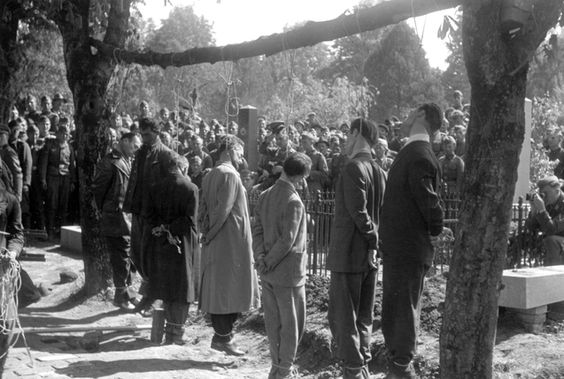 |
| Another view of the Pancevo Massacre of 21-22 April 1941. |
The Luftwaffe bombs and sinks:
- Greek destroyer Hydra off the island of Lagousa in the Saronic Gulf (42 deaths, including Commander Th. Pezopoulos)
- 968-ton Greek freighter Athinai in Itea Harbor
- 223-ton Greek freighter Avlis in Raphina
- 4514-ton British freighter Aghios Markos off Salamis Island
- 1361-ton Greek freighter Frinton at Megal Lefko
- Greek torpedo boat Thyella in Vouliagmeni Bay
- Greek torpedo boat Kios in the Gulf of Athens
- 637-ton Greek freighter Ioannis Nomicos off Rhion, Gulf of Corinth
- 2171-ton Greek freighter Pancration off Milos
- 657-ton Greek tanker Thedol 2 off Antikyra, Gulf of Corinth
- 1511-ton Greek freighter Thraki off Sombraina, Gulf of Corinth
- 1566-ton Greek freighter Thassos off Megara
- 985-ton Greek freighter Messarya Nomikou at Nafpactos (later raised by the Germans)
- 315-ton Greek freighter Sifnos at Suda Bay (later raised by the Germans)
- British yacht Sea Serpent off Syros
 |
| Greek freighter "Macedonia" being bombed and sunk by Junkers Ju 87 dive bombers at Spilia Phocidos (George Karelas, via ww2wrecks). |
The Luftwaffe bombs and near-misses 1054-ton Greek tanker Theodora off Antikyra, Gulf of Corinth. There are twelve deaths. The Theodora is moored next to tanker Thedol 2 and catches fire from the burning Thedol 2, causing the Theodora to sink also.
The Luftwaffe bombs and damages Greek destroyer Leon in Suda Bay, Crete.
The Luftwaffe bombs and damages 2747-ton Greek freighter Teti in the Gulf of Corinth. The master beaches it to prevent sinking.
Yugoslavian torpedo boats Kajmakcalan and Durmitor make it to Suda Bay.
Yugoslavian 4294-ton freighter Serafin Topic is interned at Oran, Algeria for use by the Italians.
The Italians seize 5387-ton Yugoslavian freighter Tomislav in Shanghai. The Italians rename it Venezia Giulia for their own use.
Convoy AG 13 departs from Alexandria bound for Suda Bay. This is the genesis of Operation Demon, the evacuation of British forces from Greece, though that operation technically does not begin for another couple of days. The ships of Convoy AG 13 will take off some of the British troops on the mainland.
Convoy ANF 29 departs from Alexandria bound for Suda Bay.
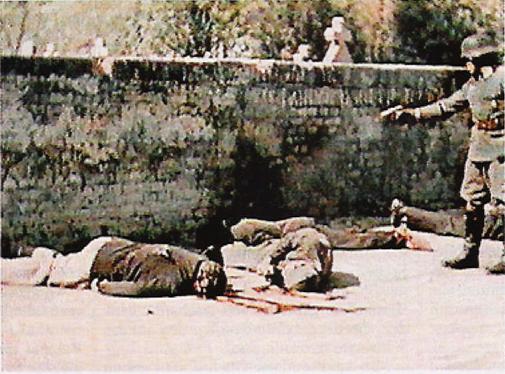 |
| Another view of the executions on 22 April 1941 in Pancevo, Serbia. This is a still from a color film taken by Gottfried Kessel of the Gross Deutschland Regiment's film squad. |
European Air Operations: The Plymouth Blitz continues with another classic Luftwaffe all-night raid. This continues the devastation of the center of town. A direct hit on a communal air-raid shelter at Portland Square kills 72 people inside. The raid damages three Royal Navy ships in drydock at the Devonport facility:
- cruiser Kent
- destroyer Lewes
- destroyer Leeds
Churchill sends Air Chief Marshal Sir Charles Portal a memorandum noting that the US will soon "bombard" (not perhaps the aptest word choice) the RAF with a "very great mass of aircraft." He suggests that Portal "start another 10 Squadrons and cut into this surplus of Spitfires and Hurricanes." As he concedes in the memo, however, the real bottleneck for the RAF's expansion is not planes - it is a lack of pilots.
During the day, RAF Bomber Command sends 14 planes on coastal sweeps off southern Norway. After dark, RAF Bomber Command raids Brest with 26 aircraft.
East African Campaign: The 1st South African Brigade troops in Abyssinia Take Camboicia Pass. They make 1200 Italian troops (mainly natives) as prisoners. This is a major step on the road to Dessie, one of the main Italian strongholds in the country.
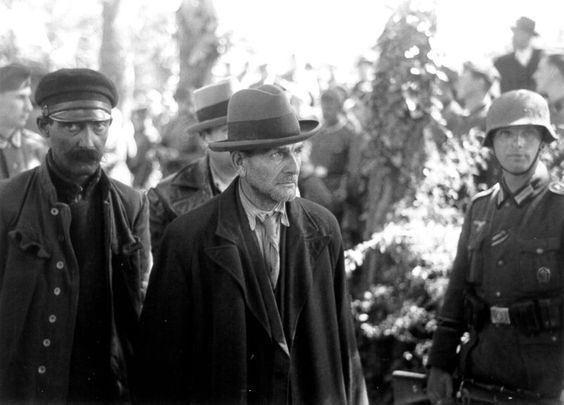 |
| Victims of the Pancevo Massacre, 22 April 1941. |
The Luftwaffe bombs and damages 5225-ton British freighter Antonio off Tyne. The ship makes it to Shields in tow.
The Luftwaffe bombs and damages 391-ton British freighter Croham at Peterhead.
British 87-ton steam barge Coronation of Leeds hits a mine and sinks off Thames Haven. All three men on board perish. Part of the barge is later salvaged.
German 551-ton freighter Obra hits a mine and sinks off Greifswald.
Convoy OB 313 departs from Liverpool.
Royal Navy anti-submarine warfare trawler HMS Tango (T 146, Lt. John Hunter) is commissioned.
Australian minesweeper HMAS Geelong is launched.
U-611 is laid down.
US destroyer USS Wilkes (DD 441, Lt. Commander John D. Kelsey) is commissioned.
Battle of the Mediterranean: Churchill sends a message to Middle East Commander General Archibald Wavell in which he confirms that the Royal Navy will deliver "307 of our best tanks through the Mediterranean... around May 10." This is Operation Tiger. Churchill notes that "99 are cruisers Mark IV and Mark VI... and 180 I tanks." He asks for a "plan for bringing these vehicles into action at the very earliest moment" and adds, hopefully:
If this consignment gets through the hazards of the passage, which, of course, cannot be guaranteed, the boot will be on the other leg and no German should remain in Cyrenaica by the end of the month of June.Of course, the Germans continue to reinforce their troops in Libya, too, with elements of several units of Infantry Regiment 19 arriving. An arms race is developing in North Africa with a very uncertain outcome.
Churchill also memos CIGS Sir John Dill, stating that it is the War Office's estimation that the British/Australian Tobruk defenders "are four or five times as strong as the besiegers," adding somewhat characteristically that "some of them are Italians." The War Office estimates that there are 4500 Axis troops besieging Tobruk.
Visiting Australian Prime Minister Menzies notes in his diary that "Bombardment of Tripoli not, I think, a great success, but some damage done."
Skirmishing continues on the Tobruk perimeter, with the Allied troops focusing on the Italian troops. At dawn, the British send armored vehicles against the 5th Light Division. Australian soldiers of the 2/48th Battalion, including three tanks and 25-pounder artillery, mount a raid southwest of Ras el Medauar. The Fabris detachment holding a hillock there loses 370 men as prisoners and 2-4 guns. A company of the 2/23rd Battalion advance toward Derna and takes about 100 prisoners of the Italian 27th Infantry Division "Brescia." The German war units note, "The Italians are surrendering."
The Luftwaffe bombards Tobruk with about 30 Junkers Ju 87 Stukas.
Lieutenant General Erwin Rommel (who is awarded the Gold Medal of Military Valor in Silver today) drives to Acroma to assess the situation. He orders the Italian Trento Division to take over for the mauled Fabris detachment. The report notes (apparently based on Rommel's inspection) that the Italian troops simply abandoned their guns and other equipment "undamaged" when surrendering and did not even take out their breechblocks. It is standard procedure in all armies to disable artillery when abandoning it to take out the breechblocks.
Rommel continues to assemble his forces for a massive set-piece battle to take Tobruk. The 15th Panzer Division continues to assemble in Tripoli, and the Allied attempts to break out of Tobruk give him a sense of urgency to move his troops across Libya for that purpose.
Australian Private Ron Daniels, the gunner on a Bren-gun carrier, continues firing after his commander, Sergeant Len Batty, is wounded during one of the morning skirmishes. Daniels himself also is wounded and receives the Military Medal for his heroism.
Around 20:30, the Luftwaffe sends a very large air raid after dark on Valletta, the surrounding area, and RAF airfields. The attack destroys 40 homes and kills about six people. The attack is very professional, with pathfinders dropping flares on a moonless night. The Luftwaffe escapes without loss.
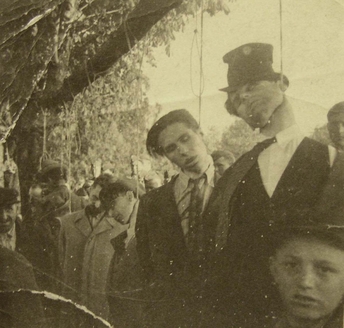 |
| Victims of the Pancevo Massacre, 22 April 1941. |
War Crimes: The Luftwaffe (Junkers Ju 87 Stukas) bombs and holes British hospital ship Vita off Tobruk. The ship sinks after destroyer HMAS Waterhen takes off 486 people (including 6 nurses).
The Luftwaffe also bombs and sinks 1134 ton Greek hospital ship Sokratis off Antikyra, Gulf of Corinth.
What happened at Pancevo, Serbia today is extremely murky and controversial. A few facts seem ascertainable:
- 18 people were shot, apparently at the Orthodox Cemetery
- 18 people were hanged, allegedly by ethnic German civilians
The names of those hung: Milanović Milan, Milivojevic Milutin, Cadik Jacob, Koceš Franja, Caran Milorad, Azick Pera, Mirđić George, Žestić Vladimir, Maxine Jovan, Topolovački Alexander, Skovran Mirko Ristic, Ljubomir Jeftic Milenko, Adamović Jovan Stojkov Dusan, Radak Kosta, Cosic Taja, Šiškulović Darinka (all from Pancevo, except for Milivojevic, who was from Omoljica near Pancevo).
The names of those shot: Humanović Tihomir, Grobanović Ivan, Tešanović Gojko, Pantelić Sava, Hadžić Dušan, Grujuć Đura, Haker Šandor, Markov Toma, Perić Steva, Crni Đura, Novak Marijan, Milenković Dragutin, Nedić Pera, Dimković Tihomir, Atanacković Draga, Atanacković Radivoj, Avramov Vasa, Pinter Stevan (All from Pancevo).
Beyond that, historians disagree. The incident was meticulously documented by filmmaker Gottfried Kessel of the Grossdeutschland Division and photographer Gerhard Gronefeld.
Some claim that it was pure butchery by the Germans.
Others claim that the Germans executed armed partisans after a lawful (if extremely brief) trial presided over by an SS man, SS-Sturmbannführer Rudolf Hoffmann of the SS Das Reich Division. Allegedly, the partisans had been firing on the Wehrmacht soldiers and were executed according to the norms of international law.
Drawing any firm conclusions as to guilt or legality is impossible. Going beyond these sketchy facts is dangerous and involves assumptions. The only firm conclusion is that the incident happened, and about 36 people died by hanging or firing squad.
There are streets named after two of the people killed, Vladimir Žestić and Jovan Maksin. Otherwise, the massacre has received little notice, then or now. A perfunctory German investigation after the war by state attorneys in Munich and Darmstadt allegedly was closed without any charges being brought. Beyond that, everything is speculation or disputed evidence. But... something bad happened in Pancevo.
German/Soviet Relations: The Soviets lodge a diplomatic protest with Germany over German overflights of Soviet territory. They complain that there have been 80 such incidents during the period 27 March 1941 - 18 April 1941. Among the proofs offered are a downed Luftwaffe reconnaissance plane complete with maps of the Soviet Union and rolls of exposed film.
US Military: Congress raises the authorized enlisted strength of the US Navy and Marine Corps. The Navy is allocated 232,000 men, with the Marine Corps strength set at 1/5 of the Navy's complement.
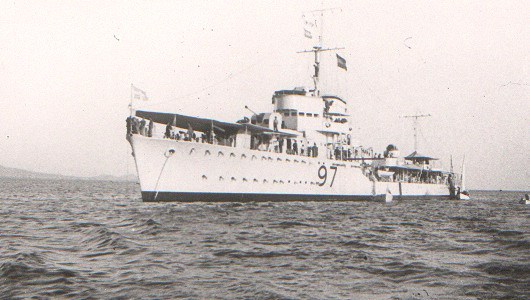 |
| Greek destroyer Hydra, sunk today by the Luftwaffe. |
Australian Government: In his diary entry for 22 April 1941, Australian PM Menzies refers cryptically to "malcontents" back home in Australia. Churchill calls Menzies and remonstrates with him about negative press commentary about the war situation emanating from Australia. Some politicians there in Menzies' own party are upset that he is spending so much time in Britain.
Japanese Government: Foreign Minister Yosuke Matsuoka returns to Tokyo, completing his productive journey to Europe. He states:
We should not confuse deliberation with procrastination just as the Tripartite Pact does not affect the relations of the Three Powers vis the Soviets so that the Soviet-Japanese Neutrality Pact and the declaration do not affect in the least the Tripartite Pact which remains the immutable basis of our foreign policy.China: The Japanese occupy Fuzhou, Fujian Province, directly across from Taiwan and south of Shanghai.
American Homefront: Thomas H. Beck, Chairman of the Board of Crowell-Collier Publishing Company, submits to President Roosevelt a proposal for the organization of a private air force. Beck's submission advocates a course of pre-flight instruction for men interested in the air force. This is a key step in the formation of the Civil Air Patrol (CAP), which is designed to be an Auxiliary of the US Army Air Corps.
 |
| The Vichy “Workers’ Committee for Immediate Relief” (Comité ouvrier de secours immédiat) confiscates Jewish property. Paris, 22 April 1941. |
April 1941
April 1, 1941: Rommel Takes Brega
April 2, 1941:Rommel Takes Agedabia
April 3, 1941: Convoy SC-26 Destruction
April 4, 1941: Rommel Takes Benghazi
April 5, 1941: Rommel Rolling
April 6, 1941: Operation Marita
April 7, 1941: Rommel Takes Derna
April 8, 1941: Yugoslavia Crumbling
April 9, 1941: Thessaloniki Falls
April 10, 1941: USS Niblack Attacks
April 11, 1941: Good Friday Raid
April 12, 1941: Belgrade and Bardia Fall
April 13, 1941: Soviet-Japanese Pact
April 14, 1941: King Peter Leaves
April 15, 1941: Flying Tigers
April 16, 1941: Battle of Platamon
April 17, 1941: Yugoslavia Gone
April 18, 1941: Me 262 First Flight
April 19, 1941: London Smashed
April 20, 1941: Hitler's Best Birthday
April 21, 1941: Greek Army Surrenders
April 22, 1941: Pancevo Massacre
April 23, 1941: CAM Ships
April 24, 1941: Battle of Thermopylae
April 25, 1941: Operation Demon
April 26, 1941: Operation Hannibal
April 27, 1941: Athens Falls
April 28, 1941: Hitler Firm about Barbarossa
April 29, 1941: Mainland Greece Falls
April 30, 1941: Rommel Attacks
2020





